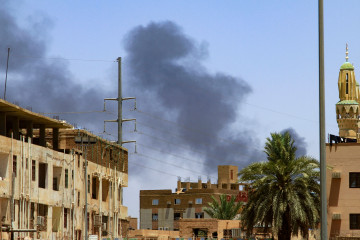
Breadcrumb

Power outages across Sudan have destroyed cold chain storage facilities for lifesaving vaccines, as well as the national stock of insulin and several antibiotics, putting millions of children at risk of disease and further health complications.
Ten days of heavy fighting until Monday — including airstrikes and artillery barrages — have killed at least 459 people, many of them civilians, wounded more than 4,000 and left some neighbourhoods of greater Khartoum in ruins.
A US-brokered ceasefire entered its second day on Wednesday but remained fragile after witnesses reported fresh airstrikes and paramilitaries claimed to have seized a major oil refinery and power plant.
"The pause was not fully upheld, with attacks on headquarters, attempts to gain ground, air strikes, and explosions in different areas of the capital," UN Special Representative Volker Perthes told the Security Council on Tuesday.
Security fears were compounded when the World Health Organization (WHO) warned of a "huge biological risk" after fighters occupied a Khartoum laboratory holding samples of cholera, measles, polio and other infectious diseases.
|
At least 32 vaccination sites have been affected, while health facilities have been depleted of staff, medical supplies and fuel, aid organisation Save the Children — which supports more than 40 sites for Covid-19 and other child vaccinations across Sudan — has revealed.
At least 39 hospitals are completely out of service, according to the Sudan Doctors’ Union and there have been reports of a children’s hospital being evacuated.
“Children are the first casualties of war – and as this crisis unfolds we are seeing that this is not just with weapons but with the destruction of lifesaving health services," said Arshad Malik, Country Director for Save the Children in Sudan.
“The country’s already depleted health system has been plunged into chaos and children, particularly those living with malnutrition or other health conditions, will be the first victims.
"Not only do we need to see this ceasefire last indefinitely – we need to make something of it by providing healthcare, food and water for children who have endured days of terror. We need the international community to do what it can to help authorities rebuild our health system and provide funding for the country’s hunger and healthcare crisis.”
|
The violence has also put healthcare, already declining as Sudan faced its worst humanitarian crisis in decades, out of reach for almost all of the country’s 22 million children, 12% of whom are suffering from malnutrition and are vulnerable to other diseases.
Many communities across the country, including the capital city of Khartoum have now gone for days without water, and children and families have been unable to stock up on food.
Already, 12 million people in Sudan – a quarter of the population – were living with acute hunger. Of the 2.7 million children living with malnutrition, 522,000 suffer from severe acute malnutrition.
“Sudan was already going through its worst-ever humanitarian emergency due to years of conflict, climate-induced natural disasters, disease outbreaks, and economic crisis. Even before this sudden uptick in violence, 15.8 million people were in need of humanitarian assistance," Arshad added.
A UN report said that "shortages of food, water, medicines and fuel are becoming extremely acute, especially in Khartoum and surrounding areas".
"In some places, humanitarian aid is all that is keeping famine at bay," UN chief Antonio Guterres said on Tuesday.
Despite the rocketing prices of fuel and bus tickets required to escape, the UN "received reports of tens of thousands of people arriving in the Central African Republic, Chad, Egypt, Ethiopia, and South Sudan," Assistant Secretary General Joyce Msuya said.
The UN warned it was bracing for an exodus of up to 270,000 refugees to Sudan's even poorer neighbours Chad and South Sudan.
Sudan, one of the world's poorest nations, has a history of military coups. The RSF emerged from the Janjaweed militia that then-president Bashir unleashed in the Darfur region two decades ago. The military toppled Bashir in April 2019 following mass citizen protests that raised hopes for a transition to democracy.
The two generals seized power in the 2021 coup, but later fell out, most recently over the planned integration of the RSF into the regular army.